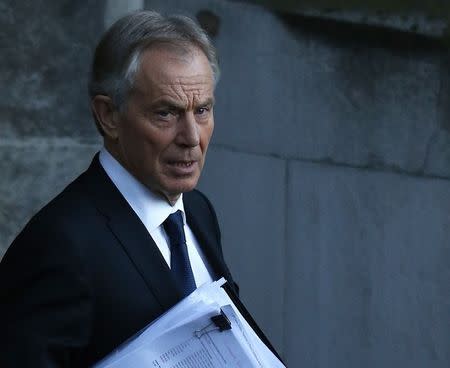Blair apologises for error that saw Irish bomb suspect go free
By Kylie MacLellan
LONDON (Reuters) - Former British prime minister Tony Blair on Tuesday defended a scheme informing Irish nationalist militants they were no longer wanted by police, but apologised that such a letter was wrongly sent to a man wanted over a deadly car bombing in London.
Suspected members of the Irish Republican Army (IRA) received the letters as part of a 1998 peace deal that largely ended three decades of sectarian violence over Britain's rule of Northern Ireland that cost 3,600 lives.
Blair, British leader at the time of that deal, said dealing with so-called 'On The Runs' had been "absolutely critical" to reaching the peace agreement.
The scheme came to light last year when John Downey, an Irishman accused of a 1982 attack in London's Hyde Park that killed four soldiers, walked free after a court found he had mistakenly being sent a letter assuring him he would not be prosecuted.
"I apologise to those people who have suffered as a result of that, but I am not going to apologise for sending letters to those who should have received those letters," Blair told a committee of British lawmakers during more than two hours of at times heated questioning.
"I defend completely the issuing of these letters," he said. "If we had literally been saying we are not dealing with this at all ... I think it is likely the (peace) process would have collapsed."
Many victims of IRA attacks were unaware the scheme existed, and the decision over Downey's case provoked anger in Northern Ireland, leading to an official inquiry and an apology by the current British government.
Blair, whose Labour party lost power in 2010, said the scheme had not been a secret however and that he had not seen it as "hugely controversial" as it dealt with people whom the prosecutors had decided were not going to be charged.
Northern Ireland Secretary Theresa Villiers, a member of Prime Minister David Cameron's Conservatives, told parliament in July the government would try to remove barriers to future prosecutions and that the around 200 recipients of the letters should not think they had a "get out of jail card".
"Would I have done that? No," Blair said. "I'm not here to criticise her but all I am saying to people in government is that you inherited a peace process that worked, so be careful with it because it is fragile still."
(Editing by Padraic Halpin and Andrew Osborn)




